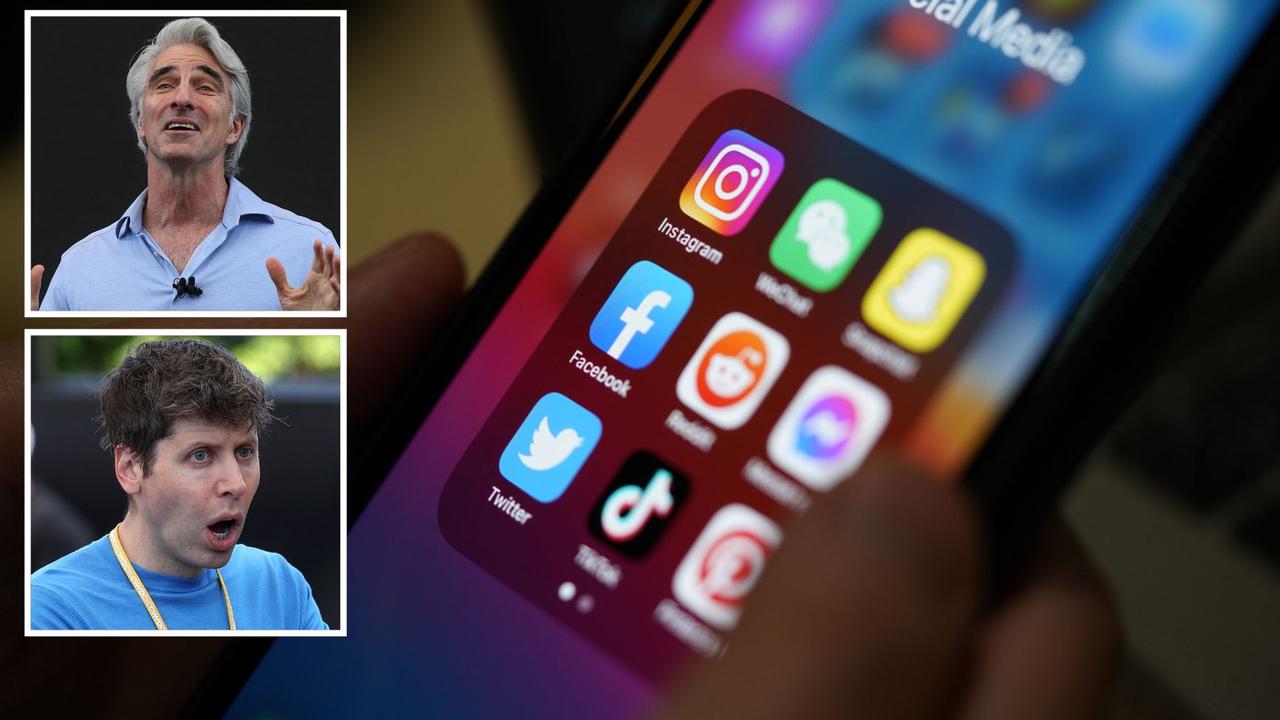Apple has announced major changes for its popular devices as it rolls out generative artificial intelligence (AI) products to more than a billion people.
The tech giant also revealed new controls and personalisation options for iOS 18 and announced when the Vision Pro headset is coming to Australia.
Headlining the Worldwide Developers Conference (WWDC) was a major new partnership with AI firm OpenAI to integrate ChatGPT software into iPhone and other devices.
Apple on Monday unveiled “Apple Intelligence”, its suite of new AI features for its coveted devices as it seeks to catch up to rivals racing ahead on adopting the white hot technology.
It’s a major change for the estimated 1.3 billion people who use iPhones around the world and will also be integrated on Apple’s laptops and iPads.
For months, pressure has been on Apple to persuade doubters on its AI strategy, after Microsoft and Google have rolled out products in rapid-fire succession.
But this latest move will take the experience of Apple products “to new heights”, chief executive Tim Cook said as he opened an annual WWDC at the tech giant’s headquarters in the Silicon Valley city of Cupertino, California.
To that end, Apple has partnered with OpenAI, which ushered in a new era for generative artificial intelligence in 2022 with the arrival of ChatGPT.
OpenAI was “very happy to be partnering with Apple to integrate ChatGPT into their devices later this year … think you will really like it”, the company’s chief executive Sam Altman posted on social media.
Apple Intelligence will also be added to a new version of the iOS 18 operating system, similarly unveiled on Monday at the week-long conference.
Apple executives stressed privacy safeguards have been built into Apple Intelligence to make its Siri digital assistant and other products smarter, while not pilfering user data.
The big challenge for Apple has been how to infuse ChatGPT-style AI — which voraciously feeds off data — into its products without weakening its heavily promoted user privacy and security, according to analysts.
The system “puts powerful generative models right at the core of your iPhone, iPad and Mac”, said Apple senior vice president of software engineering Craig Federighi.
“It draws on your personal context to give you intelligence that’s most helpful and relevant for you, and it protects your privacy at every step,” he said.
In particular, Apple Intelligence will enable users to create their own emojis based on a description in everyday language, or to generate brief summaries of e-mails in the mailbox.
Users will be able to make their requests to Siri in writing or orally.
The AI enhancements also included integrating ChatGPT with operating system models later this year, Mr Federighi said.
“It sounds like it’s Apple — then if it needs ChatGPT, it offers it to you,” Techsponential analyst Avi Greengart said.
“The implementation is what is special here.”
Silicon Valley is convinced that generative AI will profoundly change how users interact with smartphones and computers, but the technology is still in its early stages and the benefits not yet entirely clear.
The announcements at the WWDC set the stage for an expected iPhone 16 release later in the year, and open the door to “a renaissance of growth” for the company, said Wedbush Securities senior analyst Daniel Ives.
Mr Cook had foreshadowed his commitment to AI by putting more powerful and AI-ready chips on iPad and MacBook releases earlier this year.
Elon Musk blasts Apple
Elon Musk slammed Apple over the announcement, warning of potential privacy issues.
The Tesla boss, who owns social media platform X, which is developing its own ChatGPT-style service Grok, fired shots at Apple and the controversial AI firm over privacy and data concerns.
“It’s patently absurd that Apple isn’t smart enough to make their own AI, yet is somehow capable of ensuring that OpenAI will protect your security and privacy!” the billionaire wrote on X.
“Apple has no clue what’s actually going on once they hand your data over to OpenAI. They’re selling you down the river.”
Mr Musk’s post, however, has since been flagged with a “Community Note” fact check on his own platform.
“Apple has its own AI model which is explicitly distinct from ChatGPT,” the user-submitted note reads. “Apple’s model will be used by default, and is usually the only option, but in some contexts users can elect to use ChatGPT.”
Apple Vision Pro
Apple has also announced the Apple Vision Pro will expand to new countries and regions across Europe and Asia-Pacific from this month.
Customers in Australia can pre-order Vision Pro beginning Friday, 28 June, at 10pm AEST, with availability beginning Friday, 12 July.
The $6000 headset “seamlessly blends digital content with the physical world to deliver powerful spatial experiences that transform the way people work, collaborate, connect, relive memories, enjoy entertainment, and much more”, the company says.
“The enthusiasm for Apple Vision Pro has been extraordinary, and we are thrilled to introduce the magic of spatial computing to more customers around the world,” said Mr Cook.
“We can’t wait for more people to see the impossible become possible, whether working and collaborating with an infinite canvas for apps, reliving treasured memories in three dimensions, watching TV shows and movies in a one-of-a-kind personal cinema, or enjoying brand-new spatial experiences that defy imagination.”
Apple previewed a range of new “spatial computing” features for the Vision Pro as part of the latest operating system update, visionOS 2.
The major update will introduce a “powerful way for users to create spatial photos with the images already in their library” and “intuitive hand gestures to easily access important information at a glance”.
For example, while in Safari users can watch YouTube, Netflix and Amazon videos in an immersive “environment”, and while scrolling web pages users can “tap on panoramic photos and immerse themselves as the image wraps around them”.
“Siri can also read and speak the content of a web page while users multitask,” Apple says.
More than 2000 spatial apps designed for the Apple Vision Pro are now available, along with more than 1.5 million compatible iOS and iPadOS apps.

“Apple Vision Pro delivers revolutionary experiences for users and developers, and we’re excited to advance spatial computing even further with visionOS 2 just months after its initial release,” said Mike Rockwell, Apple’s vice president of the Vision Products Group.
“From navigating visionOS more seamlessly to pushing the boundaries of how users connect with memories, and enhancements to key Vision Pro apps, we can’t wait for users to experience the range of new capabilities with visionOS 2. And with a robust set of tools that enable developers to create richer spatial apps, visionOS 2 makes Vision Pro even more powerful.”
The Apple Vision Pro starts at $5999 including GST, with 256GB, 512GB, and 1TB storage capacities.
iOS 18
With the launch of iOS 18, Apple is promising even greater integration across connected home devices including TVs, AirPods and robot vacuum cleaners.
The software updates to tvOS 18 include new features like InSight, which will display information about actors, characters and music from AppleTV+ movies and shows on-screen in real time.
“Users can simply select an actor to view their background and filmography page, or quickly view the song that is playing in a scene and add it to an Apple Music playlist,” Apple says.
“Viewers can also see InSight information on their iPhone when using it as an Apple TV remote.”
The Enhanced Dialogue feature uses machine learning and computational audio to deliver greater vocal clarity over music, action and background noise, and can be used when listening through secondary devices such as AirPods and when playing supported content on iPhone and iPad.
With iOS 18, the Home app will be enhanced to introduce guest access, “providing users with convenient ways to grant guests control of locks, garage doors, and security systems … schedule individualised or time-based access to the home with smart locks … and view activity history for guests”.
AirPods Pro users will have greater ways to interact with the Siri personal assistant, including by privately responding to prompts with a simple head nod for yes or shake for no.
“Enabled by machine learning on the H2 chip, Siri Interactions allow users to answer or dismiss calls, interact with messages, manage notifications, and so much more — all without speaking,” Apple says.
“We design our Home products to elevate users’ everyday lives, and our latest updates reinforce that goal by delivering even more convenience and connection,” said Stan Ng, Apple’s vice president of Apple Watch, Audio, Health, and Home Product Marketing.





